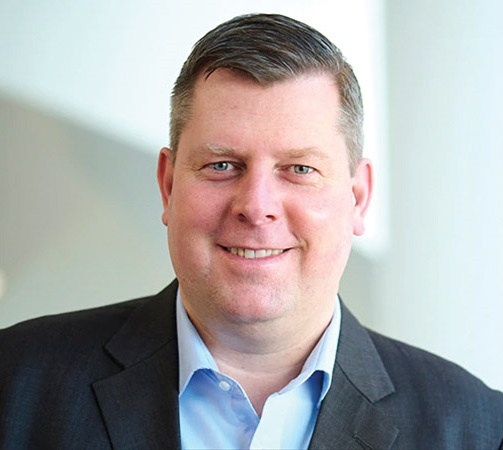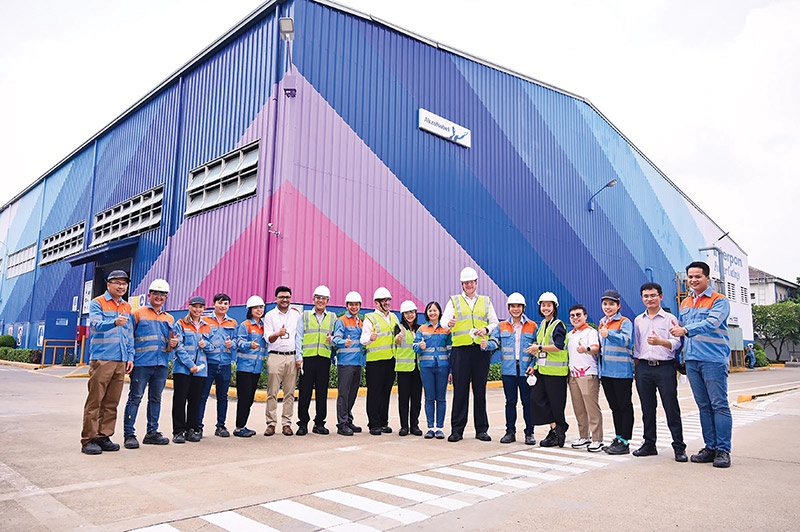AkzoNobel aiming for inclusive, sustainable growth
Why has Vietnam become one of your key regional bases and what is its potential?
 |
| Michael Friede, chief commercial officer at AkzoNobel |
Vietnam is an ideal end-market for us, with a lot of growth. The country develops rapidly and requires a lot of paint and coatings to renovate and upgrade industrial spaces. There's also huge consumer demand for products that need very good protection.
In addition, Vietnam is a great regional manufacturing hub with many very talented people. We have around 1,000 co-workers at our four manufacturing sites in Ho Chi Minh City, Dong Nai, Binh Duong, and Bac Ninh, supplying products for both Vietnamese and the regional market. We are also currently moving more of our production here.
So, we appreciate the country as a regional manufacturing hub with access to great talent but also because of the positive approach to environmental topics and political stability. Vietnam also has great incentives to invest in the country, such as certain tax incentives.
Could you give some examples of applications for your performance coatings in Vietnam?
Everything that you touch needs some kind of protection, may it be your laptop, your smartphone, or any other device – that is our consumer electronics business in which we focus on sustainable coatings with low amounts of or no solvents at all.
We supply sustainable and innovative paints and coatings that our customers, communities, and the environment are increasingly relying on. Our world-class portfolio of brands – including Dulux, International, Sikkens, and Interpon – is trusted by customers around the globe.
When it comes to other applications, we provide marine coatings for large ships which need to be protected from saltwater and be as smooth as possible to save energy and stay free of any marine life and biowaste. Our anti-corrosive protection, fouling control technologies, passive fire protection, and aesthetic solutions are underpinned by unrivalled customer service and in-field support. In the industrial space, we provide protective coatings. For example, a lot of steel and aluminium need to be protected from corrosion. Every car is coated and painted. And if these have a little dent or scratch, people want them to be repaired.
Another extremely interesting area is aerospace. Aeroplanes must be extremely light, so our clients want thin and light coatings that are super stable and safe.
But we are also offering wood coatings, which is one of our key competencies, especially in Southeast Asia. Some of these provide excellent fire protection and production efficiency for wooden facade elements, such as Sikkens’ new off-white sprayable and brushable primer RUBBOL® WP 112 FR. Additionally, by using instant drying solutions, our wood coatings can lead to shorter production times to increase capacity and save energy, thus supporting one of Vietnam’s growing export sectors.
And one of our signature technologies involves powder coatings which offer many environmental advantages as they don't need any solvents, such as our Interpon D X-Pro powder coatings which are based on the highly reliable Interpon D technology. Depending on the application, up to 50 per cent of the liquid coating could be wasted. Powder coatings, meanwhile, produce almost zero waste and can be applied to steel, wood, plastics, and many other materials.
AkzoNobel currently has four manufacturing sites in Vietnam. What are your plans to expand these in the next 5-10 years?
We are having plans to expand these sites with key investments in manufacturing capacity through new instalment and technologies. With this, Vietnam represents one of our largest investment programmes outside Europe.
We are now in the middle of a large expansion programme in Vietnam, of which the most prominent one is probably the Amata site in Ho Chi Minh City. We are partially expanding but also relocating from some other sites such as Singapore. For example, AkzoNobel’s manufacturing team has successfully completed the setup of a new powder coating manufacturing line and its supporting infrastructure in Vietnam. This new line commenced operations in Q1, 2022 and is ready to support the growth of the powder coatings business in Vietnam and South Asia.
Besides, we are focusing on initiatives to develop our people and hiring new local employees. Most of our demand for new personnel will be in the manufacturing space – such as engineers, plant operators, and so on – but we are also looking for talents in other functions to strengthen our organisation.
 |
| Michael Friede, chief commercial officer at AkzoNobel, visited some of the company’s manufacturing sites and partners in Vietnam |
What are AkzoNobel's initiatives to promote sustainability in the company’s performance coating business?
I feel AkzoNobel can make a difference in the global efforts to protect the planet. For decades, sustainable development has been part of AkzoNobel’s DNA and core values. We call these the three Ps – people, planet, and paint.
We are recognised as the leader in the sustainable paint and coatings industry and have done a lot in terms of innovation. On the one hand, it's about our end products and how we can make them more sustainable.
For instance, in a car manufacturing line, the most energy-intensive step is the painting as you need to bake the car at around 150-180 degrees Celsius for quite some time. So, if you can introduce technologies that significantly lower the baking temperature, it's an obvious benefit for the planet but also a financial one for our customers. We also develop coatings of the future that will support innovations in radar and connectivity technology, such as advanced driver assistance and 5G.
In addition, we have also signed up for the Science-Based Targets initiative, which takes the targets of the Paris Agreement and translates them into targets for ourselves.
We have committed to cut our total emissions by half by 2030, achieve half of our revenue from sustainable solutions, move towards zero waste, and provide skills training to more than 100,000 people in local communities. We also want to become carbon neutral by 2050 globally.
And we’re on the right track as our ongoing efforts are widely recognised by leading rating agencies such as Sustainalytics, FTSE4Good, EcoVadis, and MSCI. Yet we never stand still.
We continue to innovate, evolve, and make things happen.
What factors drive the sustainability of AkzoNobel’s business here in Vietnam?
Our environmental footprint is split between the raw materials we buy, the energy we use, and what our customers do with our products. About 3 per cent of our total footprint comes from our factories. About 40-45 per cent are baked into the raw materials we buy, and another 40-55 per cent represent the energy and waste that is used and produced when our customers use our products.
The easy part is to tackle our direct footprint, which we do by reducing fossil-based energy use. Around the globe, we aim to make ourselves completely independent of petrol-chemical or coal-based energy. We have solar roofs on most of our plants around the globe, including in Vietnam. This means that, by the end of this year, all our European factories will become net zero for our energy use.
But the big nut to crack relates to what our suppliers do in order to supply our raw materials. Here, we are aiming towards more sustainable raw materials; which can be recycled or biobased, but also sourced locally.
The last part relates to what we can do with our customers so that they lower their energy use. For instance, when it comes to logistics, our philosophy is to be locally present as much as possible because then we don’t need to ship our products around the planet.
How does AkzoNobel approach and work with the diverse backgrounds and cultures of the people globally?
At AkzoNobel, investing in people is an integral part of being sustainable. Focusing on organisational health and fostering an inclusive environment are key when it comes to growing our employees as fast as we grow our business.
We are a big proponent of diversity and inclusion, not just because it's the right thing to do, but also because it just gets better business results. When it comes to gender diversity, we are roughly at 50/50, which is rare for an industrial company.
We have a lot of programmes to promote diversity and make sure that there's a safe workplace for everyone. For example, we have our Next Generation Council, which is a direct line to our leadership. The council is always rotating and made up of newcomers. With this, we acquire an outside view that serves as reverse mentoring for us and helps to make sure we stay diverse in thinking.
We also have other employee resource groups, for instance for impaired people or our younger generation run by our employees but supported and funded by the company.
AkzoNobel just got awarded for the first time in Vietnam as a Great Place to Work®, so the team is extremely proud of that. In general, we don’t want to merely pay a great salary, but also build a family around our employees to give everyone a space where they can be themselves. We have great mentoring programmes set up in Vietnam to help young talents to develop their career quickly and feel at home. So, we try to do a lot to really earn the title of being a Great Place to Work® and attract the newcomers this year.
What the stars mean:
★ Poor ★ ★ Promising ★★★ Good ★★★★ Very good ★★★★★ Exceptional
Related Contents
Latest News
More News
- Masan Consumer names new deputy CEO to drive foods and beverages growth (February 23, 2026 | 20:52)
- Myriad risks ahead, but ones Vietnam can confront (February 20, 2026 | 15:02)
- Vietnam making the leap into AI and semiconductors (February 20, 2026 | 09:37)
- Funding must be activated for semiconductor success (February 20, 2026 | 09:20)
- Resilience as new benchmark for smarter infrastructure (February 19, 2026 | 20:35)
- A golden time to shine within ASEAN (February 19, 2026 | 20:22)
- Vietnam’s pivotal year for advancing sustainability (February 19, 2026 | 08:44)
- Strengthening the core role of industry and trade (February 19, 2026 | 08:35)
- Future orientations for healthcare improvements (February 19, 2026 | 08:29)
- Infrastructure orientations suitable for a new chapter (February 19, 2026 | 08:15)

 Tag:
Tag:



















 Mobile Version
Mobile Version